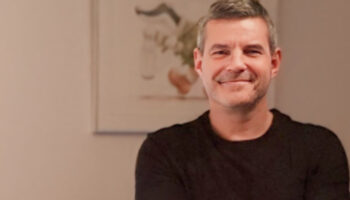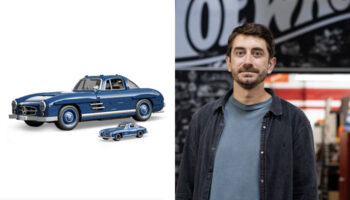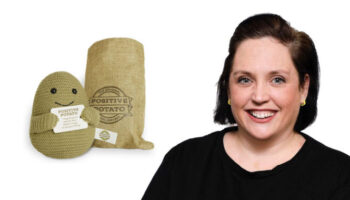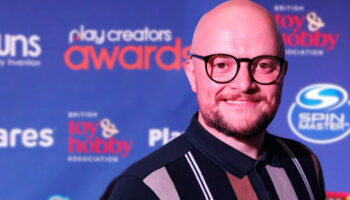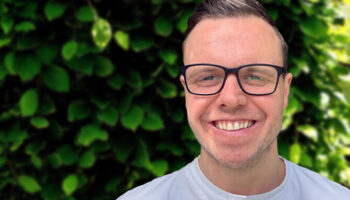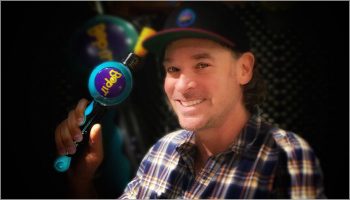How Happy Salmon’s Ken Gruhl creates party games and tabletop titles… And came to be working at Exploding Kittens

Ken, seems like a lifetime… How are you? What’s been keeping you busy this past year?
Hey Deej, great to catch up with you! Life is good over here. This past year has been an interesting time of growing as a designer, coping with quarantine, and non-stop watching a toddler. I’m enjoying the latter so much that my wife and I are doubling down, and expecting another addition to the family in early May.
Oh, wow! Congratulations! You’re building up your own team of playtesters! You know, something we didn’t ask you the first time we spoke was an obvious question: what games did you play growing up?
My family regularly played board games and was into classics like Careers, Monopoly and Five Crowns. My older brother, Tim, got me into Magic the Gathering in elementary school, and then Warhammer 40k in middle school.

Quite in depth stuff…
Yes – and by high school, my group of friends got addicted to poker! But what truly hooked me into modern games was getting introduced to The Settlers of Catan near the end of my Junior year. That experience showed me how immersive and compelling games could be – when designed well.
And beyond school, how did you get into the industry?
I tore my ACL playing soccer when I was in college, and my friend Quentin was kind enough to suggest we start a hobby since I was going to be sitting on a couch for a month.
Just to be clear, an ACL tear is a rip in a knee ligament, right? Its nasty…
Yes; it’s very nasty! But Quentin had played many classic games with my family, and was part of my gaming journey – experiencing poker and Catan in high school… So we had many of the same tastes and experiences as players. We talked about the things we loved about Catan and another favourite, Puerto Rico, then started designing our first strategy board game.

Is that something I’d know?
No! Looking back on it, that game had a couple cool elements covered by layers and layers of terrible rules and fiddly bits. Over a dozen iterations later, it never went anywhere, but it sparked my love of game design. Although we abandoned that first game, we started branching out and working on more designs. Along the way, we were fortunate to work with a couple of industry veterans who helped push us towards designing more mass-market games.
And where did you show them?
With a fresh crop of designs, the first convention we attended was the New York Toy Fair in 2010, where we worked the booth for North Star Games for three of the days, and the fourth day was ours to meet publishers. So we went to any publisher that was kind enough to take a meeting with us, and started the long road toward networking and working our way into the industry.
You recently announced you’re joining Exploding Kittens team. Tell us about that! How did it come about?
Yes! I’m very excited about this! When they reached out to see if I was interested in a senior game-design position, it hadn’t crossed my mind to work directly for a publisher because I’d been working freelance for so long. But after chatting about it with an industry friend who had travelled a similar path, he convinced me that this job was an opportunity to continue to grow as a game designer.
Sounds irresistible! And what will you be doing?
I’ll be responsible for bringing the games they have in their pipeline to market, as well as filling the pipeline with great new games.

I imagine you’d bring an interesting experience to that position… You’re one of a small group of people that’s known for creating party games and tabletop titles. What’s unique about each of those disciplines? And what do both areas share?
The basic principles of game design are the same for both party games and tabletop titles, but my approach is wildly different for each one. Each party and mass-market game usually starts with a hook or gimmick… This needs to be strong enough to pique someone’s interest even if they were to just glance at it. But for tabletop and light strategy games, I like to begin with just the gameplay mechanics, and make sure they can captivate my playtesters, even without a theme or story for the game.
Makes absolute sense. We spoke before about your love of creative techniques… What are you trying at the moment?
This is less of a technique and more of an approach, but recently I’ve enjoyed reevaluating some of my old game concepts from at least three years ago, and piecing together what I was trying to do in the design, as well as what went wrong.
Oh, that must be very interesting! It’s always intriguing to me to look at an old idea with a newer brain!
It’s fascinating seeing how you can get better at something over time, as well as looking at the same design from a different perspective. A lot of them still belong in the trash, but the occasional ones shine with a few key changes.
And what, in your experience, is the hardest part of coming up with ideas?
Getting into the right headspace! When I’m able to find a few hours of uninterrupted time, I can work wonders ideating. Saying that is easy, but actually doing it, in reality, is often a challenge. Not only do I need to clear my schedule, but I need to clear my mind of all the other tasks and distractions in my life.

Right. Some people can turn it on and off like a tap… Others, I think, need to have that space. Actually, I’m curious – although I wouldn’t normally ask – is there a technique with which you can’t get along?
Mind mapping is one that I’m not too keen on. It might be because it reminds me too much of the useless group brainstorm sessions I attended when I was in the corporate world. It always felt like it was busy work without producing solid ideas.
Oh, don’t get me started on bad brainstorming! Actually, I’ve done an opinion piece on that; I’ll link to it… You are known for your collaborations, though, working with people such as lovely Quentin Weir, for example… What do you look for in a partnership like that? What qualities make someone a good sparring partner?
They have to be way smarter than me! I’m only half joking. I love to collaborate with people that do something way better than I can. Quentin, for example, is better at most things than me, so that was an obvious partnership. In return, I bring a relentless passion to designing games and plenty of brainstorming power.
So it might be more about brainstorming with the right person?
Yes, I think great partners have no concern of pushing back on each other’s ideas, and challenging each other’s assumptions. Quentin and I have great arguments that almost always lead to better understanding and design than either of us would have done on our own.

Interesting. One area that continues to fascinate me about toys and games is the pitching of new ideas. How do you get along with that?
I really enjoy pitching concepts to publishers! These concepts are the ideas that you have been pouring your heart into, so it isn’t hard to have passion behind your pitch. The industry is also full of wonderful people who want to see you succeed, so getting a chance to pitch them games is a fun experience.
What advice would you give people pitching their first idea?
For first-time pitches, I’d recommend that you focus on being professional – and receptive to feedback. Most of what you’re going to hear is “no”… And thoroughly understanding what’s underlying that no is important. If you’re in it for the long haul, then your relationship with publishers is far more important than licensing one of your concepts..
And – just in your experience – does it get easier? I mean, you’ve got a number of titles under your belt… Does that mean people take your more call more quickly? Or that you get a slightly easier ride, do you think?
Getting published certainly helps get your foot in more doors. Practice makes perfect, so fundamentals of game design get easier too. The challenge is that your own standards will constantly be rising as you design more – which is great. When it does start to feel too easy, it usually means I need to recalibrate and set my bar higher.
Great answer! Listen, thank you so much for making time to catch up. This has been a treat! Last question, then: what’s the most interesting thing in your office?
My wife works as a packaging engineer for a food company, so our office is packed with snack food from her samples. Needless to say I don’t go hungry when working. This isn’t super interesting, but it is super tasty. And thank you for taking the time to chat, always a pleasure!

—
To stay in the loop with the latest news, interviews and features from the world of toy and game design, sign up to our weekly newsletter here


